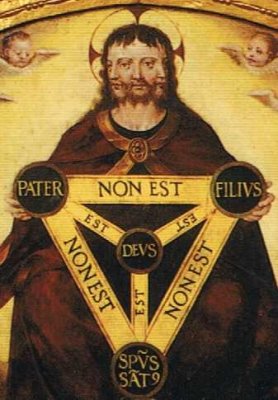Some clarifications for Dr. White
Dr. James White’s stated reasons for not debating me are based on misunderstanding.
Dr. James White’s stated reasons for not debating me are based on misunderstanding.
I argue that the theoretical costs of Bauckham’s theory outweigh its theoretical benefits.
Devastating. I have long noted that Augustinian/Calvinist theology is unpopular among Christian philosophers, though many, like me, go through a Calvinist phase (when I was a sophomore and junior in college), before seeing its problems to be hopeless. Walls concisely and fairly sums up what Calvinism is all about, and then shows it to be profoundly problematic, focusing on philosophical problem rather than biblical ones.… Read More »Jerry Walls: What is wrong with Calvinism?
What are the essential teachings which one must accept to be a Christian?
Perhaps the greatest issue for Social Trinitarians with respect to the Holy Spirit is “his” personhood.
If you suffer from this affliction, I recommend repeated listens.
Could each divine “Person” of the Trinity be either an attribute of God or God together with an attribute?
In Part 1 I explained how vague it is to say that there are three divine Persons “in” God. In Part 2, I described some different things one might mean by “Persons”. In this third part, I’ll explain some of many things it might mean to say that the three persons are one “substance” (Greek: ousia, Latin: substantia). But before I do that, it is… Read More »“the” Trinity doctrine – Part 3
I’ve been reading I Told Me So (review) by Gregg Ten Elshof, a USC PhD who who teaches and chairs the Philosophy Department at my undergraduate alma mater. He’s been thinking about this topic for a long time (part 2) and so far, I really like the book. It is clearly written, insightful, and he trains his guns on self-deceptions by Christians in particular. Some of… Read More »You’re Foolin’ Yourself and You Don’t Believe It – Part 1

This series is extracted from a paper I delivered at the APA in Chicago last month. I’ve basically just cut up the paper into smaller chunks.
As we all know, the doctrine of the Trinity states that God is three persons: the Father, Son, and Spirit. Further, two of these persons, the Son and the Spirit, are produced. According to both East and West, the Son is produced by the Father, but the East holds that the Spirit is also produced by the Father, while the West holds that the Spirit is produced by the Father and Son together. But that’s by the by. The point is that some of the divine persons are produced.
The question that interests me is this: how, exactly, does one divine person produce another? In this series, I want to look at two 4th century attempts to explain how the Father produces the Son: that of Arius, and that of Athanasius.
Read More »Arius and Athanasius, part 1 — How is the Son produced? (JT)
Do I ignore “the” being/Person distinction?
One way to deal with an apparently contradictory doctrine in your religion is the response of Restraint. There’s a connection here, with the medieval Catholic doctrine of “implicit faith”, so I thought I’d explore it a little, and in my next post, I’ll apply this to the issue of Restraint in the face of an apparent contradiction. I welcome any Catholic friends out there to… Read More »Dealing with Apparent Contradictions: Part 4 – Restraint and Implicit Faith
Here’s a gem of a passage from a little-read paper by Richard Swinburne, from this book. This is part of talk he gave at a 2001 conference in Moscow, Russia, co-sponsored by the Society of Christian Philosophers and the Russian Orthodox church. So he’s explaining the wider context of analytic philosophy to them. Sometimes, when we have to explain things to those outside the camp,… Read More »Swinburne on analytic vs. continental philosophy
Roll up, folks.
We now move one the fourth R – what I call Mysterian Resistance (or Mysterianism). The Resistor is resisting the pressure to resolve the apparent contradiction, i.e. changing one of the apparently contradictory beliefs. Unlike the Redirector, the Resister doesn’t ignore the apparent inconsistency. And unlike the Resolver, he doesn’t think there’s a reasonable way to make the apparent contradiction go away. So the Resistor resists – he makes his stand – he comes up with a rationale for keeping his apparently contradictory beliefs.Read More »Dealing with Apparent Contradictions: Part 13 – Mysterian Resistance
 This is the start of a series where I give some unsolicited advice based on things that make me want to throw the book across the room when I’m reading recent theologians. I’ll avoid naming names, but will sometimes use actual quotes. I offer it in love, though I admit I’m pretty cranky about it all. If you’re a philosopher or theologian, these are a series of “don’ts” – things to avoid. If you are a reader of theology or philosophical theology, these are some things to watch out for. If you detect a high density of them in what you’re reading, you may well be wasting your time in that book.
This is the start of a series where I give some unsolicited advice based on things that make me want to throw the book across the room when I’m reading recent theologians. I’ll avoid naming names, but will sometimes use actual quotes. I offer it in love, though I admit I’m pretty cranky about it all. If you’re a philosopher or theologian, these are a series of “don’ts” – things to avoid. If you are a reader of theology or philosophical theology, these are some things to watch out for. If you detect a high density of them in what you’re reading, you may well be wasting your time in that book.Memo my theologian friends: please, stop saying “grounded”.
Examples:
Why? Because you are faking it when you say things like thisRead More »Don’t think/write like a contemporary theologian – Part 1 – “grounded” blabber

Poetry, anyone?
Karen Armstrong is a famous ex-nun who has written, among other things, a puffing biography of the prophet Muhammad. She frequently appears on TV confidently gassing about various religious matters. But I was really taken a back by this, which I ran across in a podcast:
Ms. Armstrong: Well, you see, I think theology is poetry. That’s what my Jewish friend, Chaim Maccabee, told me all those years ago when he quoted Hillel’s golden rule to me and said, “You know, it doesn’t matter what you believe. Theology is poetry.”Read More »How not to do theology, Or: the theological Vogon (Dale)
I have been working through Alvin Plantinga’s excellent (but frustrating) book Warranted Christian Belief, and I am particularly intrigued by his critique of the work of theologian John Hick. Hick began his spiritual odyssey as a traditional, orthodox Christian, accepting what I have been calling ‘Christian belief’. He was then struck by the fact that there are other religions in which the claims of orthodox Christianity—trinity,… Read More »Are all religions the same?
I’m very pleased to introduce Joseph Jedwab, who has some interesting comments on Moreland’s and Craig’s understanding of the Trinity. I haven’t had the privilege of meeting him, but given how he spells “center”, I gather he’s English. 🙂 Joseph is currently teaching philosophy and finishing his dissertation at Oriel College of Oxford University, on the metaphysics of the Trinity and the Incarnation. And he’s working under the supervision of one of the greatest living philosophers of religion, Richard Swinburne. Hiring committees take note – he goes on the job market next year! – Dale
I agree this is a clear account. I’m a bit worried about how the discussion might influence terminology. Moreland and Craig describe their view as Social Trinitarian and contrast this with an Anti-Social Trinitarian view. This is a mistake. Leftow’s title indicates his paper is against Social Trinitarianism (ST). It’s not supposed to be the name of a Trinitarian view. As you know, the name of the view Leftow defends is ‘Latin Trinitarianism’ (LT). Further, they say that the main commitment of ST is that there are three centres of consciousness, but it’s not clear what a centre is.Read More »Guest Post: Jedwab on “Trinity Monotheism”
Evaluating Dr. Craig’s unique take on “two natures” christology, his “Neo-Apollinarian” theory.